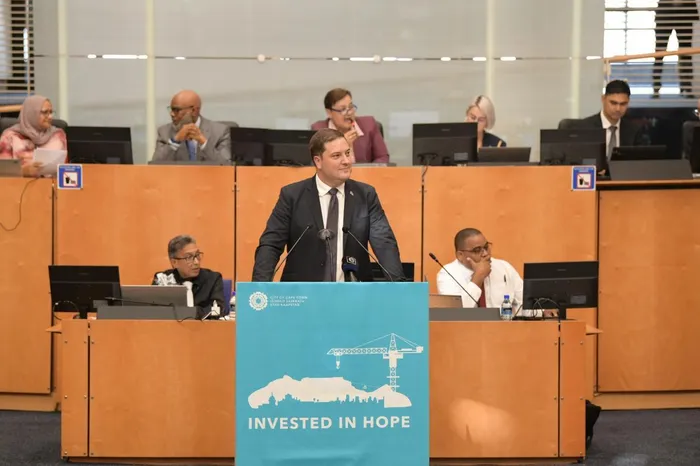
Mayor Geordin Hill-Lewis at a council meeting where he tabled the draft budget for 2025/2026.
Image: City of Cape Town/Supplied
THE constitutionality of the City’s decision to link certain fixed charges to property values in its amended Budget for 2025/26 will come under the spotlight when the South African Property Owners Association (SAPOA) hauls the DA-led administration to court.
The organisation has taken issue with the City’s cleaning tariff, the fixed water charge, and the fixed sanitation charge, saying these three items of the budget were in fact property rates imposed outside of the legislation which governs the imposition of such rates.
However, Mayor Geordin Hill-Lewis believes that the court application is an attempt to go back to a system of regressive taxation which hits ordinary families, and the poor, the hardest.
SAPOA’s membership currently comprises more than 90% of the country’s commercial and retail property industry, including some of the largest property-owning companies in South Africa.
The properties owned by their membership include the V&A Waterfront (co-owned by Growthpoint), Canal Walk Shopping Centre (owned by Hyprop), Cape Gate Shopping Centre (owned by Hyprop), Table Bay Mall (owned by Hyprop), Tyger Valley Shopping Centre (co-owned by Pareto), Blue Route Mall (owned by Redefine), Gugulethu Square (owned by Vukile), Atlantis City Shopping Centre (owned by Vukile), Sable Square Shopping Centre (owned by Spear), and Cavendish Square (owned by Old Mutual).
In his founding affidavit, SAPOA chief executive Nilesh “Neil” Gopal said that the board resolved to take legal action to have the budget declared unconstitutional and invalid.
“They contravene the applicable constitutional and national legislative framework applicable to the imposition of rates and the levying of tariffs for municipal services,” he said in papers.
Gopal added that while they acknowledge the city’s rebates that they offer, it mostly is to aid pensioners and isn’t sufficient to offset the impact the tariffs will have on them.
“These reductions and rebates do not detract from the fact that the three items are unlawful and should not have been introduced in the first place: A reduction or a rebate cannot save a charge which was unlawfully imposed,” he said.
Gopal maintained that the continued rise in municipal costs had a significant detrimental effect on the costs of occupancy faced by tenants in commercial/retail properties.
“My point is that the systems of exemptions, reductions, and rebates established by the City under the Cleaning Tariff (as well as the Fixed Water Charge and the Fixed Sanitation Charge) are different from the Rates Act. It relies, however, on the General Valuation Roll ("GV Roll”) established under the Rates Act. It is an impermissible parallel system of rates.
“For all these reasons, the Cleaning Tariff, while purporting to be a service, is a rate, but an unlawful one, because it does not comply, or even follow the scheme let alone the letter of the Rates Act,” he added.
The relief SAPOA is seeking is to have the budget declared invalid.
However, the order of invalidity should be suspended for two months to allow the city to deal with the revenue shortfall that will result from the invalidity of the three items.
Hill-Lewis said the city cannot agree that wealthy property owners should be charged the same as lower-income or middle-class households.
“This would be regressive, would place a disproportionate burden on ordinary families, and would be patently unfair.
“The city’s budget protects homes under R2,5m and extends rates relief to many more middle-class homes, all while preserving the city’s critical infrastructure and service investments,” said Hill-Lewis.
If SAPOA were to succeed in their argument, the effect would be ‘to have ordinary families effectively subsidising the wealthiest property owners’, said Hill-Lewis.
“Fixed charges linked to property value are a lawful, fairer, and equitable way for Capetonians to contribute within their means to our city’s infrastructure programme and fixed service costs. Cross-subsidising – where the better off among us help to fund services for the less fortunate – is the only sustainable way to ensure a working city of hope for all,” said Hill-Lewis.
The Cape Town Collective Ratepayers’ Association (CTCRA), an association with 56 ratepayer associations and civic organisations from across Cape Town, has thrown its weight behind SAPOA’s decision, saying: “This case is not just of importance to the ratepayers of Cape Town. If left unchallenged, there is a realistic possibility that other municipalities in South Africa will adopt CoCT’s methods. It is critical that the rule of law, fairness in service delivery, and constitutional accountability are upheld – not just for our city, but for the nation.”
Cape Times
Related Topics: